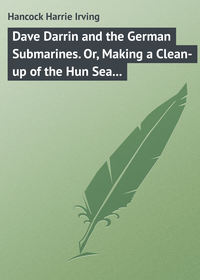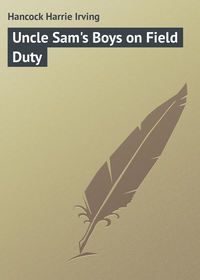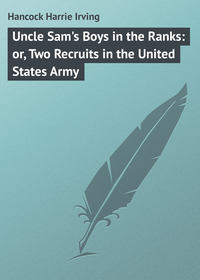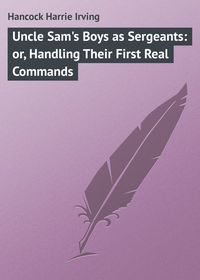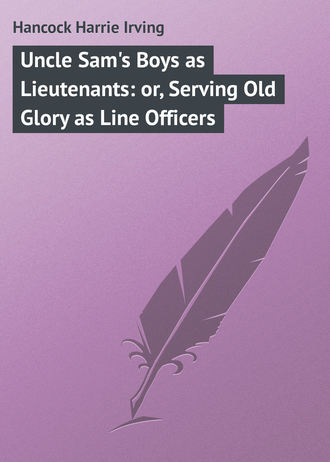 полная версия
полная версияUncle Sam's Boys as Lieutenants: or, Serving Old Glory as Line Officers
Guarez swung his foot back as though intending to plant a vicious kick in Bolton's face.
"Have done with cowardice, Guarez!" ordered Lieutenant Hal sternly.
"Oh!" sneered the Mexican. "Me? I do as I please, and it would give me joy to kick your head off."
"I'd bide my time, and make you swallow your own foot in time, if you did," retorted Hal undauntedly.
"Be not too bold, my very young friend," warned Guarez, "or I shall deal with you at my leisure by taking you across into Mexico with me to-night."
"Try it!" dared Hal contemptuously.
For answer Guarez struck his boot lightly against Overton's lips. It was not a hard blow, nor did it cause any pain, but the meanness of the action brought the hot blood to Lieutenant Hal's face.
"I'll wait my own time to make you apologize humbly for that, you contemptible, cowardly Greaser!" broke impetuously from the Army boy's insulted lips.
An instant after the words were out Lieutenant Hal regretted the use of the word Greaser. That word, as a term of contempt for people of another country should not have been uttered by an officer of the Army.
"Bah!" retorted Guarez. "Some other time for you, my young jaguar."
As he went away Guarez signed to his companions, who followed him. There were now left as guards over the military prisoners two Mexicans. These were each armed with a forty-five Colt's revolver, and both appeared to be wholly alert.
"If any one among you calls for help," remarked one of the guards, "my orders are to reward you with steel."
Throwing back his coat the fellow displayed the hilt of a poniard.
"What's the use of shouting?" demanded Hal indifferently, "when my other guards are beyond reach of my voice?"
The Mexican laughed quietly, adding something in Spanish in an undertone to his companion.
"I hope you don't blame us, sir?" asked Private Simms.
"How can I censure any of you?" asked Hal bitterly, "when I was caught myself by the same easy trick?"
"Don't tell me, after this," muttered Private Simms, "that a Mexican is stupid and has no brains."
Conversation, though allowed in low tones by the two Mexican guards, soon died out among the soldiers, every one of whom felt secretly disgusted and ashamed of himself.
Twenty minutes, or more, passed before Hal, lying with one ear to the ground, heard the somewhat distant sound of moving horses. Soon after the roll of wheels came to him. Then, around a corner of the road, not far away, wagons turned and made toward the shore of the Rio Grande.
"Moving day with you fellows, is it?" demanded Hal of the guard who spoke English.
The fellow chuckled quietly.
"You've outwitted us, haven't you?" demanded the young lieutenant dryly. "You're moving munitions of war toward the river. You expect to ship them soon – but perhaps you won't succeed."
"You may prevent, if you can," laughed the Mexican.
"We shall see what will happen," retorted the Army boy.
"Nothing – so far as you American soldiers are concerned," came the triumphant answer.
"You shall see," vaunted Hal, though inwardly he groaned. He had been outwitted, in his first command as an officer, and he could feel the hot shame of the whole thing.
"But I don't see how you fellows can get anything out of Guarez's barn, unless you have been able to noose the whole of the sergeant's guard posted there."
Another laugh, and one of undisguised, unmistakable merriment, escaped the Mexican.
"Eh?" wondered Hal, for that laugh set him to thinking. Yet he did not pretend to himself that he could fathom what lay behind that laugh.
"It is our night to laugh," explained the guard.
"Your merriment is ill-timed, then," growled young Overton. "Wait until you have all your war stuff on Mexican soil before you laugh again!"
"My time to laugh is every time that I look at you seven brave soldados, tied up like so many chickens for the butcher," grinned the guard. "In the meantime, our boat must now be at the pier, and soon she will be laden. Then – ah, well, there will be rejoicing on the other side of the Rio Grande!"
"I'll wager there'll be rejoicing," thought Lieutenant Hal. "And, as for me, I'm an officer with a blasted reputation. I've failed with my first chance to do my duty!"
In sheer disgust with himself, though he was really little if any at fault, Lieutenant Hal Overton, U. S. Army, rolled further over that he might cool his hot face against the cool earth.
CHAPTER XIV
AFFAIRS TAKE A MILITARY TURN
AS he did so Hal's hands touched against the wrists of Private Simms, who lay next to him.
"Confound me, why didn't I think of that before?" the Army boy demanded of himself, a sudden, brief hope surging up in his breast.
Then he tried it, to see how well it would work.
Though he was bound at elbows and wrists, the young lieutenant's fingers were free. Wriggling slightly nearer, Hal fingered at the cords that bound Simm's wrists. That soldier felt and understood. Wriggling slightly nearer, and doing it so easily and gradually as not to attract the attention of the Mexican guard, Simms waited to see what would come of his officer's new move.
Slowly, diligently, Hal worked at the first knot. He felt a thrill of joy when his busy fingers untangled that knot. Then another one, and another one. Simms's wrists were free! The soldier, without attracting attention so far, moved himself slightly so as to bring his bound elbows within easy reach of Lieutenant Hal's fingers.
But there was no telling at what moment these fanatic Mexicans would discover what was going on, and balk it all.
Simms's wrists were free. Slowly, the soldier tried to repay his officer. Then Hal's wrists were free; then his elbows.
Two of the prisoners were now free, though they were careful not to move their arms in the least.
Yet how much had been gained? Two men there were who might leap up and fight for their lives. But they were unarmed, while the alert Mexicans had revolvers in their hands and dirks within instant reach.
Had either Hal or his man been able to roll over completely, one more comrade's knots would then be within reach. Yet, in rolling, either lieutenant or private would surely betray to the guards the fact that the cords were loosed from his arms. Nor could there be much doubt as to what the two desperate Mexicans would do in the face of any attempt at escape.
Hal lay there deliberating, trying to plan some move that would carry with it a reasonable prospect of victory. Simms, fearing to spoil any of his officer's plans, kept wholly silent, though alert for any signal.
"It's only the slimmest kind of a fighting chance yet!" muttered Hal. He would have been despondent, but his soldier's training had taught him that no situation is hopeless as long as life lasts.
Then craft, slowly, but insinuatingly, entered the young lieutenant's head.
"Confound you Mexicans," he growled aloud, "this is a bigger night for you than I had thought."
"What mean you?" demanded the guard who spoke English.
"I thought but one wagon train of your supplies would go to the water front this night."
"Eh?"
"And now, with my ear to the ground, I hear another lot of wagons in the distance, headed this way."
The guard looked non-plussed. He stood erect, listening. Then he spoke in Spanish to his fellow-Mexican, who, answering only with a nod, stepped further away to listen.
"I could tell you something, my friend, that it would be worth your while to know," continued Hal, craftily.
"What?"
"Only your ear shall hear it. Bend low, if you are curious."
The guard, without fear of the supposedly bound captive, stepped closer, bending over the young Army officer.
With a quick turn and a leap Hal Overton was up and at the throat of his captor. Taken so utterly by surprise the Mexican strove to leap back. But Hal had grappled with him and wrenched the revolver away. The Mexican reached for his handy knife. It was no time for niceties. Hal dealt the fellow a swift blow on top of his head with the butt of the revolver.
Mr. Mexican crumpled and lay where he had stood. But the other Mexican was closing in now.
"Get your hands up as high as you can, fellow!" ordered Hal. Just in the nick of time he remembered Captain Foster's instructions, and spoke in English instead of Spanish. But his gesture was eloquent enough for no words to be needed.
The second Mexican showed no cowardice, yet in this threatened battle at close quarters he dropped his revolver for the more trusted knife.
"Put your hands up and stop this nonsense!" commanded the young officer, stepping forward, holding the revolver at his belt, the muzzle covering the body of the swarthy foe.
The Mexican proved to possess no mean courage. With his knife-hand uplifted he sprang at Hal.
At that very instant a form hurled itself through the air. Private Simms fell at the feet of the Mexican. Without pause the soldier wrapped his arms about the Mexican's knees, throwing the fellow backward with jarring force. In another second Simms had possessed himself of the knife.
"Good!" came a devout chorus from the five bound but watching soldiers. "Great!"
"That was a fine specimen of soldierly wit and promptness, Simms," commended Lieutenant Hal heartily.
"Not half equal to what I've heard that you've done in the Philippines and elsewhere, sir," replied Simms modestly, as he seated himself on the fallen foe. "Will you take this knife, sir, and free the other men, or shall I leave this fellow in your care while I set the men free?"
"I'll free them," agreed Hal, taking the knife. Inside of a minute the young officer had five more serviceable soldiers at his orders.
"Now, lash these two rascals," commanded Lieutenant Overton. "This fellow, first, whom I was obliged to beat with his own revolver."
The tying was done by two of the soldiers. Then the wretch whom Simms bestrode was treated to some of the same sort of consideration. The pair of Mexicans were laid side by side, after which the soldiers sprang to get their cartridge belts and rifles.
"Check and Varnum, you two stay here with your prisoners, and give them no license to shout or pass signals. Check, fix your bayonet, and stand over these fellows. If either opens his mouth, shove your bayonet into it. Varnum, make it your business to watch over Check and see to it that he doesn't get the noose from behind, as all of us did once."
While speaking Lieutenant Overton was fastening on his own recovered revolver and cartridge box.
"Now, you other four men," he concluded, "come with me. Silence and soft steps must be our watchword. Unless we have the worst sort of evil luck we'll find out what's going on at the water front."
The distance was not great. Hal did not make the mistake of moving his abridged command of four men down the road. Instead they kept to the woods or behind bushes as much as they could.
As he came within sight of the water Lieutenant Hal held up his hand – a signal to halt. Then he peered through the darkness.
"Just about as I had supposed," he whispered. "Guarez has a tug in at the pier – a steam craft that will move out, as it came in, without lights."
"Queer, sir, that some of the other men haven't acted – they must have seen the tug come in."
"But I am supposed to be on duty in this neighborhood, and so are you men as sentries," whispered Lieutenant Overton. "Our other men, up the river and down, must imagine that we have taken care of the tug, if the craft needed such attention, and so the other men are holding their own posts according to their orders. Now, come on, men. Crouch low and make no noise. If you see me run for the pier follow without waiting for orders."
The military party succeeded in getting within a hundred and fifty yards of the land end of the pier. From here Hal could make out the figures of men lifting the last two cases to the deck of the tug.
At the same instant a man on the pier caught sight of the advancing soldiers. With a shrill whistle the fellow leaped to the deck of the tug, calling out to some one.
Without loss of a second Lieutenant Hal sprinted forward, dashing on to the pier.
In the engine room of the tug a single bell sounded – the moving signal. The last two cases had just been dumped on the deck, and two men leaped ashore, rushing for the shore-ends of the hawsers.
"Lift that hawser and I'll shoot you!" warned Lieutenant Hal.
"Who in blazes are you?" roared a deep, powerful voice from the deck of the tug.
"I'll ask the same question of you, sir," shot back Hal, running up.
"I'm the master of this tug, and I give the orders here!"
"I'm an officer of the United States Army, and your boat is undoubtedly to be seized by the government," Hal retorted.
The gang-plank had been drawn in, but Lieutenant Hal, measuring the distance with the eye of an athlete, leaped on to the deck.
Two of Hal's soldiers followed him aboard, the other two remaining on the pier.
"What's your name, sir?"
"Boggs," growled the master, a thick-set, powerful-looking, red-faced man of perhaps fifty. "What's yours?"
"I am Lieutenant Overton, of the United States Army," answered Hal.
Guarez and three other Mexicans ran out from the cabin and tried to leap ashore.
"Don't let these Mexicans get away if you have to shoot them down," Hal ordered quickly. "They're United States prisoners."
"This is a high-handed proceeding, Lieutenant," stormed Captain Boggs.
"Isn't it?" jeered Hal. Then, to the soldiers on the pier:
"Drive those two deckhands aboard, and stand ready to cast off, my men, when I give the order."
"What on earth are you up to here?" blustered Boggs.
"I'll tell you about that, sir, when I have time," Lieutenant Hal answered.
The two deckhands having come aboard sulkily, the soldiers stood by the hawsers.
"Cast off!" directed Hal. "Come on board, Captain Boggs, I'll trouble you to step into your own wheel-house."
Pedro Guarez stood by the low rail, in the way of the party's progress forward.
"Guarez, I'll trouble you to step aside."
The Mexican snarled, made a move as though to reach for his knife, then sullenly obeyed and stood aside.
At the door of his wheel-house Captain Boggs hesitated.
"I don't believe I'll go into the wheel-house," he growled.
"Guess again," rejoined Lieutenant Overton grimly. "Would you rather go in of your own accord, or be jabbed in there by a soldier's bayonet?"
"You've no right to take such high-handed action," snarled the master of the tug.
"You're in no position to decide that, Captain. You're a United States prisoner, at least until I have had opportunity to communicate with my superior officer. Go inside, sir."
Boggs obeyed, and Hal stationed a soldier at the wheel-house door.
"Now you Mexicans get back into the cabin," Hal continued, stepping back amidships.
"We're going ashore," snarled Pedro Guarez.
"You're going to obey orders," Lieutenant Hal retorted, "and I've ordered you into the cabin."
Instead Guarez turned as though he would leap ashore. The tug had now drifted some six feet from the string-piece of the pier.
"Squad, load!" ordered Hal sharply.
"Shoot if you dare!" challenged Guarez. "My friends and I are going ashore." Then he addressed a few words in Spanish to his friends. The words were so rapidly uttered that Overton could not understand them.
"Squad ready!" called Hal sternly. "Aim – "
To the ears of the Mexicans it sounded as though the word "fire" trembled on the young officer's lips. Guarez led the wild rush into the cabin.
Hal smiled. He had not had the least intention of firing upon the Mexicans. His seeming firmness had been enough.
"Close the cabin doors on both sides, and guard 'em," Lieutenant Overton directed. "Simms!"
"Yes, sir."
"Run back up the road and bring Check and Varnum, and their prisoners here without delay."
"Very good, sir."
Simms measured the distance to the string-piece with accuracy, then he made a leap and landed.
The engineer and fireman stood leaning out over the closed lower half of the engine-room door.
"What do you want us to do, General?" demanded the engineer, with a grin.
"Just stay where you are," Hal answered pleasantly. "Obey the bell-signals and keep steam up, and I don't believe you'll run into any hardship."
CHAPTER XV
TO OBEY ORDERS, OR NOT?
PRIVATE Simms soon returned, bringing with him Check and Varnum and the two Mexican prisoners. The Mexicans were forced to join their kind in the cabin, and Hal had two more soldiers to back his authority.
"Simms, hurry back to camp, looking out for the noose on the way. Report to Captain Foster what you've seen here, and inform him, with my compliments, that I await his further commands. This boat will wait at some distance out in the stream."
Just before Hal gave these instructions, Captain Boggs had been directed to run his boat back against the pier. Simms, saluting, stepped ashore and went off at brisk stride.
"One bell ahead, Captain," ordered Lieutenant Hal, showing his face at the wheel-house window.
"I don't know whether I'll do that or not," growled Boggs, filling a short, black pipe and lighting the tobacco.
"You'll either obey orders, sir, or you'll go back into the cabin with the Mexicans, and let your mate run the boat. If your mate refuses he'll join in the cabin and I'll do the best I can with the boat myself. Now, sir, are you going to obey orders?"
"Where do you want to go?" growled the riverman.
"One bell ahead."
"But where are you bound for?"
"That is none of your business, as you are no longer in command here. One bell ahead, sir."
Boggs looked as though he were going to balk flat, until he saw Hal turn as though to summon a soldier. Then the tug's master reached for the bell-pull. Clang! The tug's propeller began to churn slowly.
"Throw the wheel over two points to port," Hal continued. "Now, hold her steady ahead."
Still at half speed the craft moved out into the river some four hundred feet.
"Stop your speed, Captain."
Boggs obeyed, demanding next, "What now!"
"Nothing until I tell you," Lieutenant Hal responded.
"But the drift will carry us downstream."
"If we get too far down we'll steam back. Mate!"
"Aye, aye, sir," answered the man standing beside the tug's master.
"Get your masthead light out. Then display your starboard and port sidelights. Men," called Hal to his soldiers, "I call upon you to note and remember that this craft had no lights out until I ordered them out."
"We don't need lights out at the pier," growled Boggs, comprehending the meaning of Lieutenant Overton's remark.
"I believe you do," Hal rejoined, "when you are about to leave the pier for the stream. However, that's a point for higher authority than yours or mine to determine."
The mate soon had the running lights properly displayed and returned to the wheel-house.
Very slowly the boat drifted downstream. After fifteen minutes Hal directed that the skipper take his boat far enough upstream to make up for the drift.
From time to time the Army boy turned his gaze toward the pier. Hal had no need to bother himself with discipline aboard. All the crew and the Mexicans were confined where they could be watched, for the two deckhands were Mexicans, and had been driven in with the others. Five of Uncle Sam's soldiers were enough to keep the prize safe.
Lieutenant Overton was beginning to grow impatient when he saw a squad of troops, as he judged them to be in the darkness, march out on to the pier. Then the voice of Captain Foster hailed:
"Lieutenant Overton!"
"Here, sir."
"Bring that tug in."
"Very good, sir."
Hal gave the order to Captain Boggs, who sulkily obeyed. The mate was permitted to go aft and to bring two swarthy deckhands out where he could use them.
The boat was soon berthed, and hawsers made fast. Without waiting for the gang-plank to be placed Captain Foster sprang aboard, grasping his "youngster's" hand.
"Fine work, Mr. Overton!" commended the captain heartily.
"It came near being very bad work, sir."
"So I've gained from what Simms has told me on the way down here. But you showed the real commander, Mr. Overton, in your ability to extricate yourself from a bad mess and turn it into victory."
Captain Foster had brought with him a sergeant and ten men. There were now enough soldiers to post so that there need be no fear of any of the prisoners being able to escape.
"Sergeant, have two of the cases brought ashore," directed Captain Foster. "And open them."
Some of the cases were on the deck forward. Others had been dropped into a small hold forward.
The cases opened proved to contain rifles, ten to a case. Some smaller boxes from the hold were found to hold cartridges to fit the rifles.
"A very bad business for you, Boggs," remarked Captain Foster.
"Why is it?" demanded Boggs gruffly.
"You were going to smuggle these arms and supplies into Mexico, across the river."
"Where's your proof?" demanded the tug's master cunningly.
"Our Mexican prisoners are proof enough," replied the Army captain, with a shrug of his shoulders. "That and some of the other wild doings of to-night. Captain Boggs, you will prepare to accompany us back to camp."
"Why?"
"Because you're a prisoner, charged with conspiring to break the laws of the United States."
"But who'll look after my boat?" demanded Boggs.
"She'll be under guard of a squad of my men, and your mate, deckhands and engine-room force will be enough to give the boat any care she really needs. Mr. Overton, march the Mexicans out of the cabin under guard."
Hal promptly obeyed. Guarez and his companions appeared to be furious, and contended loudly that their rights were being infringed.
"That's all a matter for higher government authorities to settle," responded Captain Foster, with a shrug of his shoulders. "I cautioned you this morning, Guarez, against any enterprise of this sort, and you did not see fit to give my suggestion any consideration. You must now take the consequences. Sergeant Raney, take six men and escort the prisoners to camp. My compliments to Lieutenant Terry, and he is directed to take all precautions that the prisoners do not escape."
"Very good, sir."
After the escort had left with the prisoners Hal saluted his superior officer, asking:
"Sir, shall I re-post the sentries who were noosed and taken away from their posts?"
"It is hardly necessary, Mr. Overton. This boat is a government prize, and I propose to use her, for to-night at least, for the patroling of the river at this point. Mate, I see that you have a search-light."
"Yes, sir," the mate admitted.
"Is it ready for operation?"
"There is plenty of current, sir, and the lamp can be switched on from the wheel-house."
"Turn the light on once for a test, then."
The mate complied, sending a glare of light out over the dark waters.
"Switch the light off," called Captain Foster, next turning to remark to his young lieutenant:
"I don't want to let him manipulate that light enough to send any signals to possible Mexican watchers, Overton."
"I was just thinking of something of the sort, sir," Hal smiled. "And there's another puzzle in my mind. Have you any idea, sir, how these Mexicans got the cases out of Guarez's barn in spite of your guard at that point?"
"The cases didn't come from Guarez's barn," replied Captain Foster, with a laugh. "Do you begin to see light, Mr. Overton?"
"I believe I do, sir," muttered Lieutenant Hal. "The cases in Guarez's barn, it may be, are only dummies, put there with a good deal of display, so that if troops came their commander would be sure to hear about them. The Mexicans probably imagined that, after an American military commander came here, heard the gossip about boxes in Guarez's barn, and then guarded that barn, that the commander would then feel that all needed precautions had been taken. That was Mexican craft, but Guarez failed to understand that he was dealing with American thoroughness."


